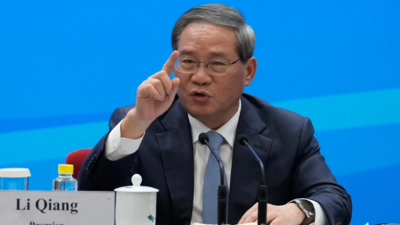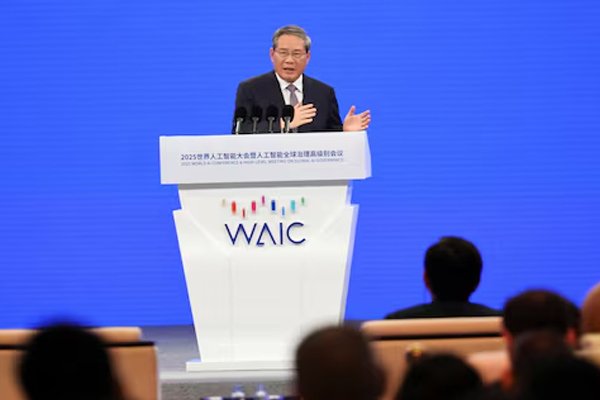
In 2025, China’s strategic push to dominate the global artificial intelligence (AI) landscape is accelerating, driven by a blend of geopolitical ambition, technological innovation, and economic pragmatism. Beijing’s vision for AI is no longer confined to domestic markets; it is a cornerstone of its broader Digital Silk Road (DSR), an initiative that seeks to weave China into the digital fabric of developing nations. This strategy is not merely about selling technology—it is about reshaping the global AI value chain, positioning Chinese firms as indispensable partners in the infrastructure, governance, and applications of AI. For investors, the implications are profound: emerging markets and Chinese tech stocks are poised for a surge as this ecosystem expands.
The Geopolitical and Technological Engine
China’s AI strategy hinges on three pillars: open-source models, infrastructure investment, and soft power. The release of DeepSeek’s R1 in early 2025 marked a turning point. With 97 million active users by April 2025 and over 2.5 million downloads of derivative models in a single month, R1 demonstrated that Chinese AI could rival U.S. counterparts in performance while offering a fraction of the cost. These models are open-source, adaptable, and designed for low computational overhead—critical for countries lacking the resources to build AI from scratch.
The DSR, an extension of the Belt and Road Initiative (BRI), is the delivery mechanism. By 2025, Chinese firms like Huawei Cloud and Alibaba Cloud have expanded data centers across Africa and Latin America, creating the backbone for AI deployment. This infrastructure is not just about connectivity; it’s about embedding Chinese AI into the digital infrastructure of partner nations. For instance, in Nigeria, developers are fine-tuning R1 to incorporate local languages like Hausa and Yoruba, while in Brazil, the model is being adapted for agricultural planning and climate modeling.
China’s geopolitical playbook is clear: leverage AI to counter U.S. export controls and assert leadership in global governance. The 2023 Global AI Governance Initiative, which emphasizes inclusivity and multilateralism, positions Beijing as a benevolent partner to the Global South. This aligns with a broader narrative of China as a “technological benefactor,” a role reinforced by the Edelman Trust Barometer 2025, which shows higher AI optimism in developing nations compared to the U.S.
Emerging Markets: The New AI Battleground
The economic impact of China’s AI strategy is most visible in Africa and Latin America, where open-source models are enabling leapfrogging in sectors like healthcare, education, and finance. In Kenya, fintech startups are using R1 to build microfinance tools tailored to local economic structures. In Mexico, AI-driven agricultural systems are optimizing crop yields for smallholder farmers. These applications are not just theoretical; they are creating tangible value for economies that have long been excluded from the high-tech revolution.
However, the real opportunity lies in the infrastructure layer. Chinese companies are not only exporting models but also building the digital ecosystems to sustain them. For example, Huawei’s 5G City projects in Brazil and South Africa are integrating AI with telecommunications, enabling smart grids, autonomous vehicles, and real-time data analytics. This creates a flywheel effect: better infrastructure attracts more AI applications, which in turn drive demand for further investment.
Tech Stocks: Where to Invest in the AI Surge
For investors, the most compelling opportunities are in Chinese tech firms directly benefiting from the DSR and AI partnerships. Here are three key sectors to watch:
- AI Infrastructure Providers:
Companies like VNET Group (VNET) and Wasion Holdings (WASION) are leading the charge. VNET’s wholesale business saw 86.5% year-over-year revenue growth in Q1 2025, driven by surging demand for AI data centers. Its capacity utilization hit 76.2%, and it has raised 2025 revenue guidance to RMB 9.15–9.35 billion. Wasion, meanwhile, secured RMB 185.71 million in contracts for smart meters and transformers in Q2 2025, with expansion into Latin America and Africa adding HK$940 million in overseas exposure.
-
Open-Source AI Developers:
Startups like DeepSeek and Moonshot AI are becoming household names in the AI world. While not yet publicly traded, their rapid adoption is fueling growth in affiliated firms. For instance, Alibaba Cloud (BABA) reported 18% revenue growth in Q1 2025, with AI products maintaining triple-digit growth for seven consecutive quarters. The company’s investments in open-source AI tools and cloud infrastructure position it as a key enabler of the DSR. -
Industrial and IoT Sensors:
Firms like Anhui XDLK Microsystem are capitalizing on AI-driven demand in robotics and autonomous systems. Its MEMS inertial sensors, critical for disaster monitoring and industrial IoT, saw a 58.1% year-on-year earnings surge in Q2 2025. With a 57% net margin, the company is well-positioned to benefit from AI infrastructure expansion in emerging markets.
Risks and Considerations
While the opportunities are vast, investors must remain cautious. The DSR’s success depends on geopolitical stability and the ability of partner nations to absorb and adapt to Chinese technology. Concerns about data sovereignty, surveillance, and long-term dependency on Chinese infrastructure are valid. Additionally, U.S. and European firms are beginning to respond with open-source initiatives and price reductions, as seen with OpenAI’s recent moves.
Conclusion: Positioning for the Next Wave
China’s AI ambitions are reshaping the global value chain, creating a dual opportunity: emerging markets are becoming hubs for AI adoption, and Chinese tech stocks are poised for growth. For investors, the key is to focus on companies that bridge the gap between infrastructure and application. Prioritize firms with strong DSR ties, robust AI partnerships, and scalable business models. As the world moves toward an AI-driven future, China’s strategic push is not just a story of technological competition—it’s a blueprint for the next decade of global innovation.
In the end, the question is not whether China will dominate AI, but how quickly investors can adapt to this new reality. Those who act now—by targeting the right sectors and companies—stand to gain the most from the Digital Silk Road’s next phase.







